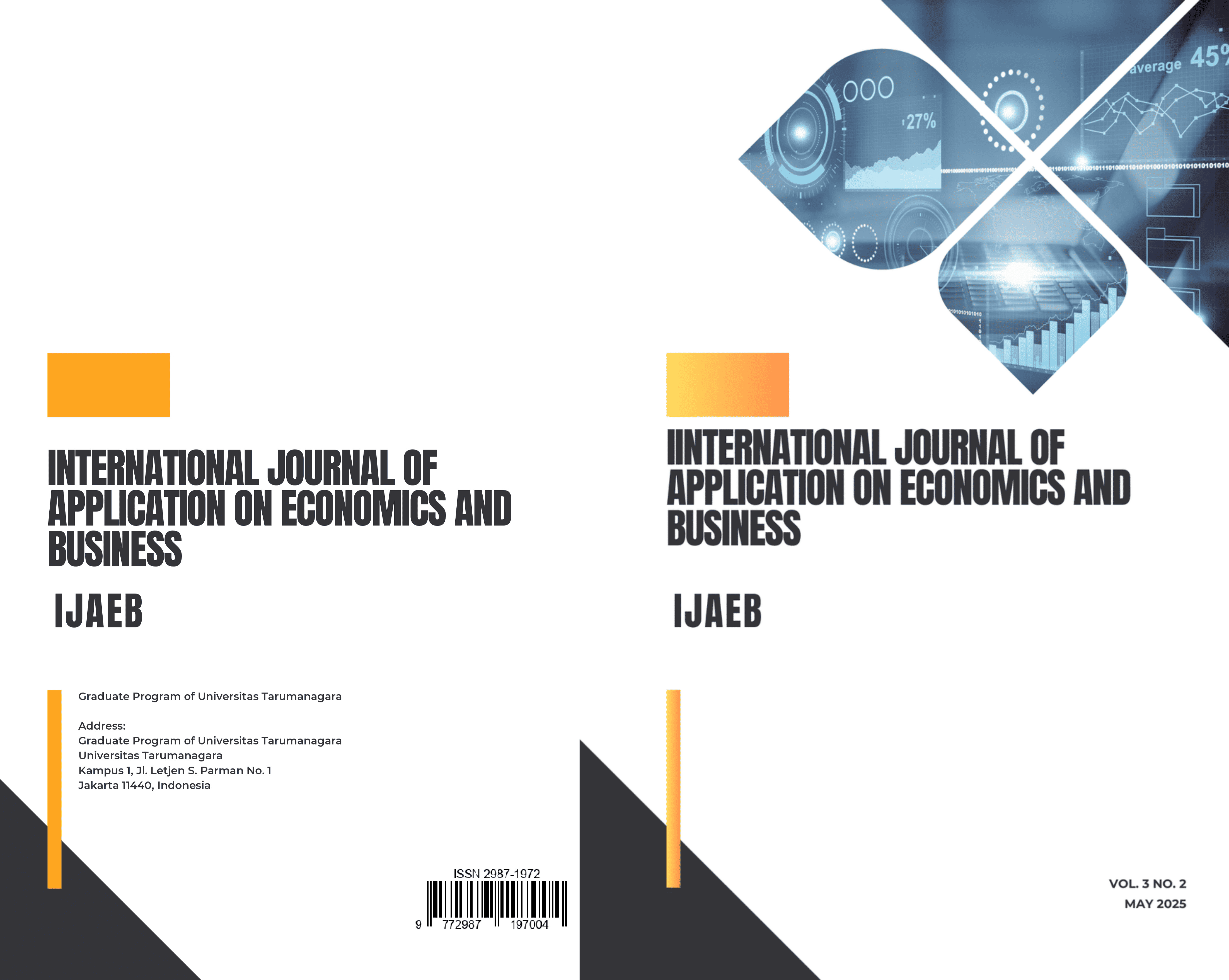THE EFFECT OF IFRS ADOPTION ON REAL EARNINGS MANAGEMENT WITH THE MODERATING ROLE OF BOARD CHARACTERISTICS
Main Article Content
Abstract
This study was carried out with the objective of determining the effect of International Financial Reporting Standards (IFRS) on Real Earnings Management (REM) practices using board characteristics as a moderating variable that determined by board size, board independence, CEO duality, board expertise, and gender diversity. This research employs a quantitive approach, utilizing purposive sampling technique with a sample of 31 non-cylical consumer sector companies that listed on Indonesia Stock Exchange (IDX) for the periods of 2009-2011 and 2019-2023. Data is processed using STATA application with the PCSE Estimator feature in testing the hypothesis. This research results indicate that IFRS, board independence, board expertise, and gender diversity do not exert a substantial on REM. While board size exerts a considerable negative influence on REM and CEO duality exerts a considerable positive influence on REM. In addition, it was found that board size moderates significantly positive for the correlation between IFRS and REM, where CEO duality and board expertise moderate significantly negative. However, there’s no moderating effect of board independence and gender diversity variables were found in this study. So it can be concluded that board characteristics partially moderate the correlaction between IFRS and REM.
Article Details
Section

This work is licensed under a Creative Commons Attribution-NonCommercial-ShareAlike 4.0 International License.
This journal provides immediate open access to its content on the principle that making research freely available to the public supports a greater global exchange of knowledge.
IJAEB by Graduate Program of Universitas Tarumanagara is licensed under a Creative Commons Attribution-NonCommercial-ShareAlike 4.0 International License.. Permissions beyond the scope of this license may be available at https://journal.untar.ac.id/index.php/ijaeb
References
Anh, L. H. T., & Khuong, N. V. (2022). Gender diversity and earnings management behaviours in an emerging market: a comparison between regression analysis and FSQCA. Cogent Business & Management, 9(1), 2101243.
Abubakar, I. A., Ishak, R. B., & Chandren, S. A. (2017). The effect of board attributes on real earnings management in Nigerian financial institutions. Journal of Accounting, Business and Finance Research, 1(1), 76-83.
Attia, E. F., Ismail, T. H., & Mehafdi, M. (2022). Impact of board of directors attributes on real-based earnings management: further evidence from Egypt. Future Business Journal, 8(1), 56.
Beasley, M. S. (1996). An empirical analysis of the relation between the board of director composition and financial statement fraud. Accounting review, 443-465.
Cahyati, A. D. (2018). Dampak Penerapan Ifrs Terhadap Kualitas Laporan Keuangan Dan Arus Investasi. JRAK: Jurnal Riset Akuntansi dan Komputerisasi Akuntansi, 9(1), 49-74.
Chouaibi, J., Harres, M., & Ben Brahim, N. (2018). The effect of board director’s characteristics on real earnings management: Tunisian-listed firms. Journal of the Knowledge Economy, 9, 999-1013.
Fama, E. F., & Jensen, M. C. (1983). Agency problems and residual claims. The journal of law & Economics, 26(2), 327-349.
Graham, J. R., Harvey, C. R., & Rajgopal, S. (2005). The economic implications of corporate financial reporting. Journal of accounting and economics, 40(1-3), 3-73.
Hasan, M. T., Hossain, M. K., Rekabder, M. S., Molla, M. S., & Ashif, A. S. M. (2022). IFRS adoption and real earnings management in Bangladesh: The role of board characteristics. Cogent Business & Management, 9(1), 2094587.
Jensen, M. C., & Meckling, W. H. (1976). Theory of the firm: Managerial behavior, agency costs and ownership structure. Journal of financial economics, 3(4), 305- 360.
Katsurayya, H., & Sufina, L. (2016). Pengaruh Konvergensi IFRS terhadap Manajemen Laba dengan Mekanisme Corporate Governance sebagai Variabel Moderating pada Perusahaan Sektor Property dan Real Estate yang Terdaftar di Bursa Efek Indonesia Tahun 2010-2014. Jurnal Keuangan dan Perbankan, 13(1), 77-96.
Li, X., Than, E. T., Ahmed, R., Ishaque, M., & Huynh, T. L. D. (2023). Gender diversity of boards and executives on real earnings management in the bull or bear period: Empirical evidence from China. International Journal of Finance & Economics, 28(3), 2753-2771.
Lippens, M. (2010). The mandatory introduction of IFRS as a single accounting standard in the European Union and the effect on earnings management
Mardianto, M., & Dwiyanti, W. (2024). Board Characteristics and Earnings Management. Assets: Jurnal Ilmiah Ilmu Akuntansi, Keuangan dan Pajak, 8(2), 130-139.
Nurwanti, I., Hendrian, T. P., Nabila, R., & Lestari, H. S. (2022). Ownership Structure, Board Characteristics, Dan Dividen Policy Pada Perusahaan Manufaktur Yang Terdaftar Di BEI. Jurnal Ekonomi, 27(1), 16-33.
Oh, H. M., & Jeon, H. J. (2017). Does board characteristics constrain real earnings management? Evidence from Korea. Journal of Applied Business Research, 33(6).
Rahmawati, A., & Putri, M. N. (2020). Peran good corporate governance dalam memoderasi pengaruh manajemen laba terhadap nilai perusahaan. Liquidity: Jurnal Riset Akuntansi dan Manajemen, 9(1), 63-75.
Rajeevan, S., & Ajward, R. (2019). Board characteristics and earnings management in Sri Lanka. Journal of Asian Business and Economic Studies, 27(1), 2-18.
Ramadan, G. R. (2021). Board Of Directors Gender Diversity And Real Earnings Management: Does Female Board Of Director Matter?. Jurnal Reviu Akuntansi dan Keuangan, 11(2), 306-320.
Saleh, A.F., & Ellouz S. (2024). The moderating role of corporate governance mechanisms in the relationship between IFRS and Real Earning Management: Evidence from KSA and UAE. International Journal of Management and Technologies, 19 (1), 48-69.
Saleh, T. (2020). Mengagetkan! Terancam Didepak, Tiga Pilar Cetak Laba Rp 1,1 T. Diakses dari https://www.cnbcindonesia.com/market/20200702233607-17-169877/mengagetkan-terancam-didepak-tiga-pilar-cetak-laba-rp-11-t
Scott, W. R. (2015). Financial accounting theory. Pearson.
Senjani, Y. P. (2013). Manajemen laba akrual dan riil sebelum dan setelah adopsi wajib IFRS di Uni Eropa. Jurnal Etikonomi, 12(1).
Wulandari, T. R., & Adiwati, A. K. (2016). Perubahan Relevansi Nilai Informasi Akuntansi Setelah Adopsi IFRS. Jurnal Akuntansi Multiparadigma, 6(3), 412-420.
Zang, A. Y. (2012). Evidence on the trade-off between real activities manipulation and accrual-based earnings management. The accounting review, 87(2), 675-703.

